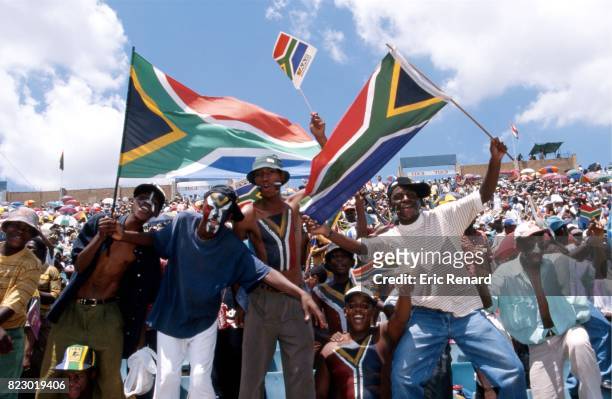January 31 1996.
It was Semi-Final day of the 15th African Nations Cup and the loud soughing sounds of trees along the littered streets of Soweto and the Golden Highway strangely felt like nature was air-blowing the famous epicenter of Black resistance before a major event. The game between host South Africa and Ghana was not going to be another ordinary soccer game.
The din from the Vuvuzelas and the accompanying stomping of feet by the Toyi Toyi bands was by itself an intimidating reminder that South Africa was getting ready to collect another sport achievement to pad its newly found self- importance after independence.
It was month’s end and so flush with paychecks, the Flag waving Toyi Toyi crowd massing around and toward the FNB Stadium was a full-throated patriotic lot frightfully inspired by Alcohol, Mandela, and Country. Toyi toyi is a protest dance with one purpose: choreographed fear. And the new Rainbow flag was a declaration of intent.
That fear was plainly noticeable in the Black Stars team when the game itself began. Playing in the heart of Ghana’s defence, Afo Dodoo, a chap who grew up in Nungua was clearly in over his head and did not have the tools to stop Umkhonto We Sizwe on a mission to extract self-respect at soccer that late January
afternoon.
South Africa, aided by a clearly jittery match official from Egypt won the frantic encounter 3-0. Disoriented by the experience, Ghana’s coach Ishmael Kurtz would later blame a noisy and humid stadium for the defeat. Three days before, the Brasilero, with a Ghana flag in hand, looked imperious after Ghana’s quarter-final win over the DR Congo in the southern city of Port Elizabeth.
In the years since that game, traveling (akwantuo) American conservatism, African religious cults and Islamic jihadists have reshaped my understanding of flags as a powerful brainwashing tool of countries, and for group think. Psychologists with expertise on identity representation and group behavior have long concluded that how we feel and act is acutely impacted by the groups we are affiliated with or belong to.
And Flags, I suspect, have a front-seat role in group behavior. If Flags, otherwise inanimate colorful strips of fabric, could speak they would most likely tell us they do not enjoy becoming extensions of human emotions in the wind, rain, and sun. They hate being burned by liberal activists frustrated by boneheaded decisions of politicians, just as much as they are dubious about being used as a shield to hide the true intentions of White racists who still long for an ideal they lost more than 160 years ago in the American Civil war.
And they hate being dragged along on murderous rampages by ISIS, Boko Haram, Janjaweed and other insurgents who claim to feel socially and spatially excluded by the political class. Christian Crusaders, Moors, Genghis Khan, The Samurai, Communists, European explorers pillaging foreign lands, Pirates and Arab Slave raiders all had one thing in common, the Flag.
They flutter despairingly on high-end automobiles and yachts ferrying dictators and rich royals whose only credentials for power is either birth or violence or, more menacingly, a combination of the two. The idea of Meaning, what we ascribe that meaning to, and how we project it has always been a mystery to me. If I knew I would have figured out what dreadlocks in combination with bright display of Red, Yellow and Green symbolize beyond what Marcus Garvey said it represented. If there’s a cause, there’s a Flag.
That brings me to Kwesi Aprah. At 15 he was the oldest in my class 6 group at Sehwi Juaboso, and when asked what the colors of the Ghana flag meant his answer was either a reflection of his thoughts at the time or an inspiration from his mature imagination; but I will leave that judgement to you.
Green was for kontomire, Yellow for plantain and Red for Palm Oil. At 15, Kwesi had not traveled twenty miles beyond his mother’s hut and Ghana’s flag could only represent his reality.
This weekend in cities across the rain forest of Cote D’Ivoire, hapless colorful flags strung on nylon ropes and metal poles are fluttering in the harsh African sun to celebrate another edition of the biannual African soccer event, AFCON. If you get past the facades of the gleaming new and remodeled stadiums, you will notice Red and Green as the two most dominant colors with every country’s flag having one or the other.
Collectively these flags at the various AFCON venues represent friendship, but if you want to probe further, then you may want to get close to fans in country colors. This is the only time regular folks will come together with anyone who is Somebody in ruling political classes to celebrate and curse with flags in hand.
In the stands with Flags will be travelling bookmen, shoeshine boys, neighborhood slay queens, mechanics, corrupt FA officials, greedy European soccer scouts and agents, etc. Each expecting a win.
Flags are no laughing matter and while I am not questioning their attributions, as a man with long held suspicions about anyone or anything claiming to represent anything I will not put my hopes on adolescent boys and young men paid millions of dollars to play in rich European soccer leagues to represent anything more than their own self-interest.
In the meantime, you may salute a flag for representing our intents or our follies, intended or otherwise; but remember it did not ask for attention in the elements even if it was hoisted on a rocket to the Moon.
By Kofi Opare Addo
